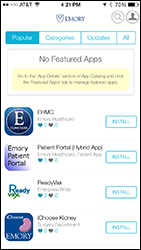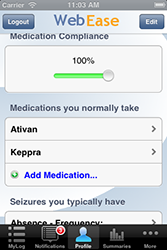Enterprise Architecture


A respected leader in IT architecture, Steve Wheat became Emory's Chief Information Technology Architect in July of 2008. His strategic leadership and tactical execution of organization-wide initiatives improve customer satisfaction and bottom-line financial performance. He has extensive experience in leading the design, implementation, and integration of web-based applications and services.
In FY14 the IT Architecture group focused on several aspects of mobile application and web application infrastructure.
Mobile App Review and Distribution
We worked with OTT, Legal Counsel, Marketing and Communications, and Emory's compliance officers to establish a mobile app review and distribution process to help Emory faculty, researchers, and clinicians develop and release mobile apps under the Emory brand using Emory's mobile marketplace accounts with Apple and Google. An important offshoot of this effort was another initiative to work through the business and legal aspects of releasing apps that consumers pay to use. We worked with LITS Finance and Administration, Legal Counsel, and OTT to update our distribution process to support paid apps.
Also in the area of mobile technology, we piloted and implemented an internal mobile app store to distribute mobile apps to Emory people. This helps Emory develop and test mobile apps that will eventually be released to the public and more precisely manage mobile apps that will remain internal at Emory. Michael Konomos, a medical illustrator and lead multimedia developer for the School of Medicine writes, "We approached Steve and his group about making it easier to distribute the apps that we are creating in-house. With Apperian EASE we finally have the easy solution we've been looking for. Our faculty and staff can now easily get access to our custom apps, and they even put in the extra time to ensure that logins can be done with an Emory ID, which was crucial to adoption of the new platform."
 Emory Healthcare Apps
Emory Healthcare Apps
The IT Architecture team also worked with Dr. Chris Dente and Dr. Bryan Morse to develop a mobile application that implements their algorithm for determining the potential benefit of Massive Transfusion Protocol (MTP) for patients. The application launched in September 2014 and is used by Emory trauma surgeons at Grady to help determine when MTP is beneficial and to further the research that developed this algorithm.
We worked with Emory Healthcare to develop a prototype of a mobile app for distributing approved mobile app functions and information to Emory clinicians. The idea of Emory Healthcare Mobile for Clinicians began in discussions with Emory Healthcare's Chief Medical Information Officer, Julie Hollberg, and departments wanting to share protocol information. In discussing a mobile application to deliver this content, we envisioned an application that could deliver a set of services including reference data, calculators, directory information, and more. We have developed a prototype of this application to demonstrate how such an app might look and we've included information about the Antithrombotic Therapy Interruption Protocol.

HIPPA Audit Logging Service
In FY13 the IT Architecture group worked with Information Security to develop the HIPAA Audit Logging Service to serve as a central point with a standard interface for creating HIPAA audit logs for all apps developed at Emory. In FY14 the IT architecture group completed the HIPAA Auditing Proxy Service (HAPS). HAPS looks at the request bound for an endpoint that exposes electronic public health information (ePHI), determines its action, derives any implied data changes, and then creates a HIPAA Audit Log Entry to send to the HIPAA Audit Logging Service (HALS) if that request is successful. This means that the HIPAA audit logging function can now be inserted into composite applications at runtime rather than coded into them at development time. WebEase, WebEase Mobile, and the Massive Transfusion Protocol Mobile Web App will be the first applications to implement HIPAA Audit Logging by sending their request through HAPS.
Steve Wheat
Chief Information Technology Architect, LITS Enterprise Architecture
"We approached Steve and his group about making it easier to distribute the apps that we are creating in-house. With Apperian EASE we finally have the easy solution we’ve been looking for. Our faculty and staff can now easily get access to our custom apps, and they even put in the extra time to ensure that logins can be done with an Emory ID, which was crucial to adoption of the new platform."
Michael Konomos
Lead Multimedia Developer
Emory School of Medicine